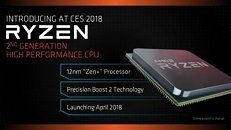Friday, March 2nd 2018

AMD Ryzen 7 2700X Spotted With a 3.7 GHz Base Clock, 4.1 GHz Turbo
AMD's next iteration on their very positively received Zen microarchitecture is preparing for take-off in the coming months, and as we draw ever close to the release date, more details are trickling in. This time, it's the appearance of a Ryzen 7 2700X (which supersedes the original Ryzen 7 1700X) on Futuremark's 3DMark database. The Ryzen 7 2700X was paired with an ASRock X370 Taichi motherboard (still considered one of the best ever to grace AMD's new AM4 platform), and its 8 cores and 16 threads are locked into a 3.7 GHz base and 4.1 GHz turbo clocks (respectively 300 MHz higher base and turbo clocks that the 1700X's).
The usage of AMD's XFR 2.0 (eXtended Frequency Range) and Precision Boost 2.0 could mean that the CPU is able, in certain scenarios, to turbo over the specified limit of 4.1 GHz, up to 4.2 GHz, thus delivering an even bigger boost to its performance. The usage of a 12 nm process means AMD has taken the power savings and increased frequency potential that comes from shrinking their original Zen microarchitecture, and put those to increased frequencies across the board, thus increasing their CPU's single-thread performance. Being an X chip,. AMD has kept the package TDP at a still respectable 95 W, much like its 1000 series Ryzens, though we know that this 95 W figure doesn't really spell out just how energy efficient these AMD CPUs really are.
Sources:
ComputerBase, WCCFTech
The usage of AMD's XFR 2.0 (eXtended Frequency Range) and Precision Boost 2.0 could mean that the CPU is able, in certain scenarios, to turbo over the specified limit of 4.1 GHz, up to 4.2 GHz, thus delivering an even bigger boost to its performance. The usage of a 12 nm process means AMD has taken the power savings and increased frequency potential that comes from shrinking their original Zen microarchitecture, and put those to increased frequencies across the board, thus increasing their CPU's single-thread performance. Being an X chip,. AMD has kept the package TDP at a still respectable 95 W, much like its 1000 series Ryzens, though we know that this 95 W figure doesn't really spell out just how energy efficient these AMD CPUs really are.




71 Comments on AMD Ryzen 7 2700X Spotted With a 3.7 GHz Base Clock, 4.1 GHz Turbo
AMD has no reason to stick to 95W in the long run. Just sayin' ... ;)
I am no exception. To be able to see the difference of frame or two, I transplanted eyes of grey falcon, and now I hunt for drops oh, so much efficiently. At the same time, with much much practice, I trained myself to differ Ultra High from anything less, and don't foolishly think that it doesn't matter so much, and that fully concentrate on background - if the leaf isn't anti-aliased with at least 16AA, it's a catastrophe! When I was young I was in some team doing graphics, and we tested extensively the effects of AA in it's varieties - foolishly, we didn't took sellers word for granted, and concluded that none of us isn't capable to notice meaningful difference above 4AA - how young and naive we were! As gamer's eye progressed toward grey falcon, everything changed and 16AA is long pass obsolete...
My mistake was choosing bird species, it's kinda noctural... BUT NO MATTER! It can see in UV! Known fact is that Ryzen CPUs are and always will be worse than Intels in UV based 1080p games...
News containing word 'Ryzen' generate automatic comment 'Intel is better, though very slightly, in 1080p, when using TitanGT or something'. Seriously, WE KNOW.
Ryzen owners get triggered when mentioning gaming or 1080p, we know, but on the other hand it's hard to judge CPU performance in games without testing CPU performance in games.
Yes, at 1440p Ryzen 7 looks much better in comparison with 8700K, but same is true about any other CPU, including Intel's i3 series.
Yes we are not mad at AMD for now that because they just got back from dark times, don't have the abysimal R&D budget of Intel, and didn't looked like they were just taking it easy for 6 years because they could afford it.
I'm not even a huge gamer, but the "Intel gaming master race" stuff tend to make thing looks much worse than they really are. I can easily see unfinformed people believe that gaming on ryzen is akin to playing on console, and not deserving to be part of the glorious PC master race.
There's already a patch for Haswell and Broadwell even, but I don't think people are talking about these when want to see the performance impact.
The right way to think about them is: whoever is in the market for an upgrade, for $300 can get a 3.4GHz CPU till April and a 3.8GHz CPU after that. Assuming pricing doesn't move much, whit it usually doesn't.
To understand this realize that the 1800X runs at 3.6 to 4.0Ghz (without XFR) the 2700X is 3.7 to 4.1Ghz (No XFR) based on the specs given. This means that the 2700X is 2.4 - 2.7% faster than the 1800X. BUT because of the way turbo works on the 2700X this is not the whole story. Because the 1800X only hits the 4.1Ghz clockspeed during limited single core situations the 2700X with a more granular clockspeed shift between the max and min speeds will have situations where it can run at 4.175Ghz-3.9Ghz while an 1800X would only be running at 3.7Ghz meaning there are situations where the 2700X can be 12.8% faster than the 1800X at stock speeds.